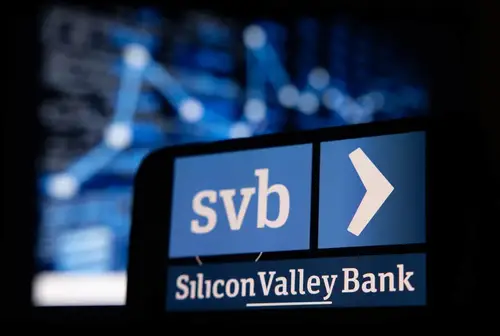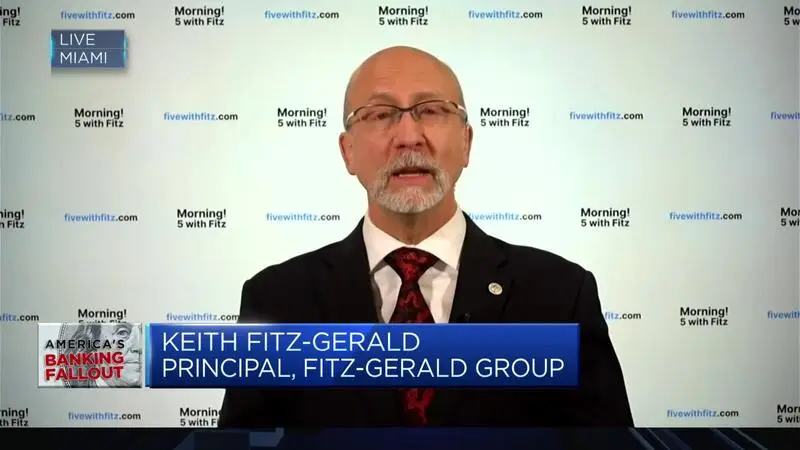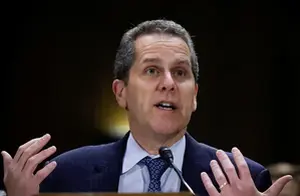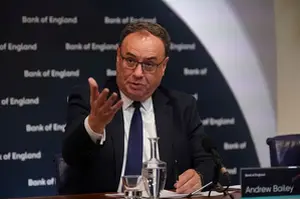
Silicon Valley's 'greed and avarice' have 'finally come home to roost' in SVB collapse, trader says
The fallout from the shuttering of Silicon Valley Bank — the second-largest bank collapse in U.S. history — continued Monday, dragging down international banking stocks.
European banking stocks were down 5.5% at 10 a.m. London time on Monday, after closing 4% lower on Friday, as U.S. financial regulators shut down SVB and took control of its deposits. All major U.S. indexes closed at least 1% lower on Friday amid the SVB panic, while regulators shut down Signature Bank — one of the cryptocurrency industry's main lenders — on Sunday, citing systemic risks.
U.S. federal regulators said that all deposits will be made whole, in a relief to many depositors. But the SVB crisis is far from an isolated incident, and its roots lie in a bigger systemic problem, many investors and analysts say.
"With regard to who's to blame here, I think that the greed and avarice that has long been present in Silicon Valley has come home to roost," Keith Fitz-Gerald, a trader and principal of the Fitz-Gerald Group, told CNBC's Capital Connection on Monday.
"We had the Federal Board of Reserve change from fractional reserves to no reserves, and that let banks like SVB go out and start buying assets instead of simply loaning money," he said. "My contention is banking should be boring, a lot like watching paint dry — and any time it's not, you've got a problem. Which is unfortunately what happened."
SVB — the 16th biggest bank in the U.S. at the start of last week — had been operational for 40 years and was considered a reliable source of funding for tech startups and venture capital firms. The California-based commercial lender was a subsidiary of SVB Financial Group, and it was Silicon Valley's largest bank by deposits.

SVB Financial Group's holdings — assets such as U.S. Treasurys and government-backed mortgage securities viewed as safe — were hit by the Fed's aggressive interest rate hikes, and their value dropped dramatically.
The company's tipping point came Wednesday, when SVB announced it had sold $21 billion worth of its securities at a roughly $1.8 billion loss and said it needed to raise $2.25 billion to meet clients' withdrawal needs and fund new lending. That news sent its stock price plunging and triggered a panic-induced wave of withdrawals from VCs and other depositors. Within a day, SVB stock had tanked 60% and led to a loss of more than $80 billion in bank shares globally.
Regulators asleep at the wheel?
Many market analysts say that regulators have been asleep at the wheel. SVB's strategy — relying heavily on corporate deposits as opposed to retail and holding a large proportion of assets in loans and securities — actually made it significantly riskier than many other banks.
Some argue that the bank's downfall was due to its leaders' greed for yield: its holdings were disproportionately exposed to long-term interest rates, which are at a 15-year high in an effort to bring down inflation. The increased rates hit the value of SVB's securities, which subsequently damaged depositors' confidence.
"SVB was in a league of its own: a high level of loans plus securities as a percentage of deposits, and very low reliance on stickier retail deposits as a share of total deposits," Michael Cembalest, J.P. Morgan's chairman of market and investment strategy, wrote in a weekend note to clients.
The lender, he said, "carved out a distinct and riskier niche than other banks, setting itself up for large potential capital shortfalls in case of rising interest rates, deposit outflows and forced asset sales."
This is more the product of a faulty system than the bank itself, Fitz-Gerald argued. Concerning federal and state regulators, he said, "I would submit not only are they complicit, they had a hand in designing this mess.... SVB did what they needed to do, arguably, within the structure of rules that are the problem. So, to me, it's the system that's broken, or at least needs to be seriously reviewed here."
'Stupid risks'
Legendary investor Michael Burry similarly called out what he described as greed and "stupid risks" in the sector.
"2000, 2008, 2023, it is always the same," Burry, who founded the hedge fund Scion Asset Management and gained fame for successfully betting against the subprime mortgage market in 2008, was quoted as saying on Sunday.
"People full of hubris and greed take stupid risks, and fail. Money is then printed. Because it works so well."
Fitz-Gerald doesn't see SVB's collapse and the crisis in the tech and crypto markets as mirroring 2008. Additionally, he sees a lower contagion risk due to federal regulators' emergency plan, announced Sunday by the Treasury Department, the Federal Reserve and the the Federal Deposit Insurance Corporation, to guarantee depositors' funds.
The contagion risk "has been substantially reduced with the FDIC, the Fed and the US Treasury Department stepping into the fray. So you know, again, this collective sigh of relief, I think that global contagion is off the table," he said.
"But," he added, "we simply don't know where the counterparty risk lies right now. So in contrast to 2008, the parallel really is 1929. They have got to stop this and they've got to stop it now. We won't know until the U.S. session opens."
"I am personally flabbergasted that the system is what it is today and that this stuff was allowed to happen," he said. "Where were the regulators? Where were the auditors? I think there's going to be very serious questions asked about how the rating systems work. Why were these banks allowed to take on assets when they should have been backing their deposits?" Fitz-Gerald asked.
"That is a fundamental issue that has got to come to the forefront now. We can't ignore it and kick the can down the road. I think it's an embarrassment to the US Federal Reserve. I think it's an embarrassment to the banking regulators, frankly."






